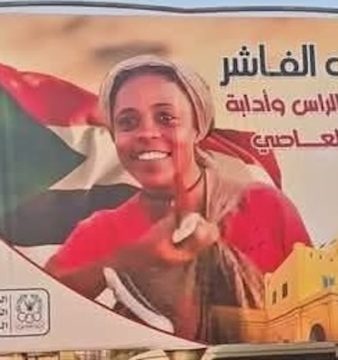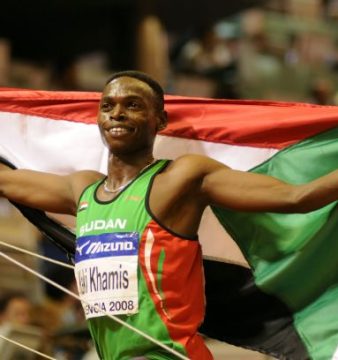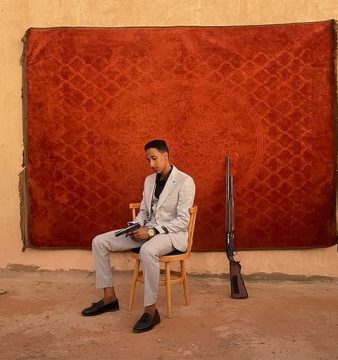Sudanese Americans Organise Largest Diaspora Anti-Government Protest
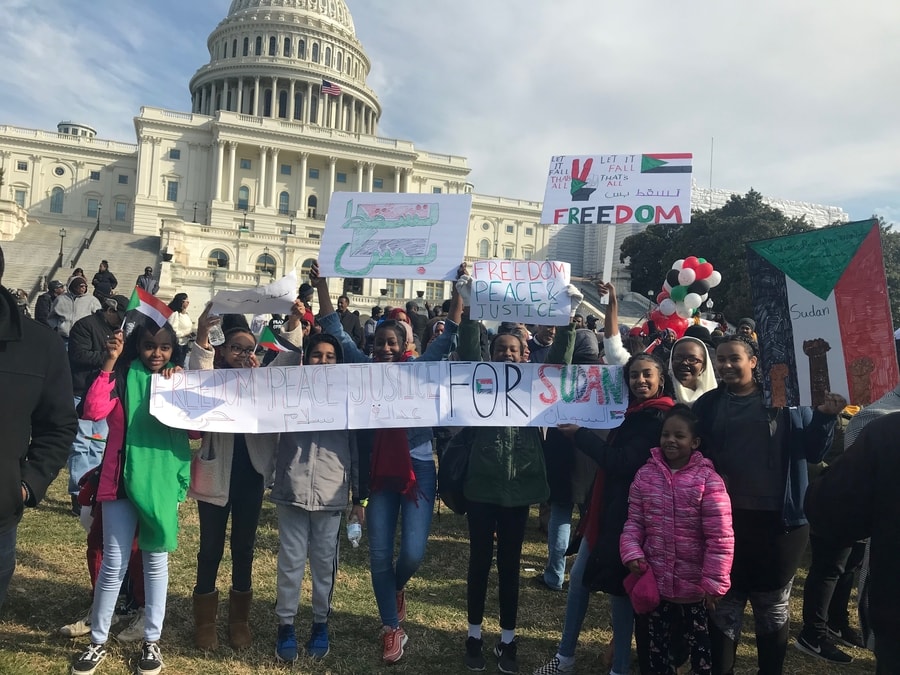
More than two months have passed since protesters took to the streets, calling for President Omar Al Bashir and his regime to step down. Compounded with a crippling economy and repressive government, Sudanese continue to express their frustration through a series of demonstrations organised by activists. While protests first erupted in the city of Atbara on 19 December 2018, revolutionary sentiments spread across Sudan and beyond, well into the diaspora.
For many of those living in the diaspora, Sudan is a fictional land of what was and what could become. With feelings of constant nostalgia fueled by a romanticised image of Sudan, the revolution is a beacon of hope. Sudanese communities in France, Italy, Canada, US, UK and in many other cities from across the world have mobilised rallies to show their support and solidarity with those fighting back on the grounds of the motherland.
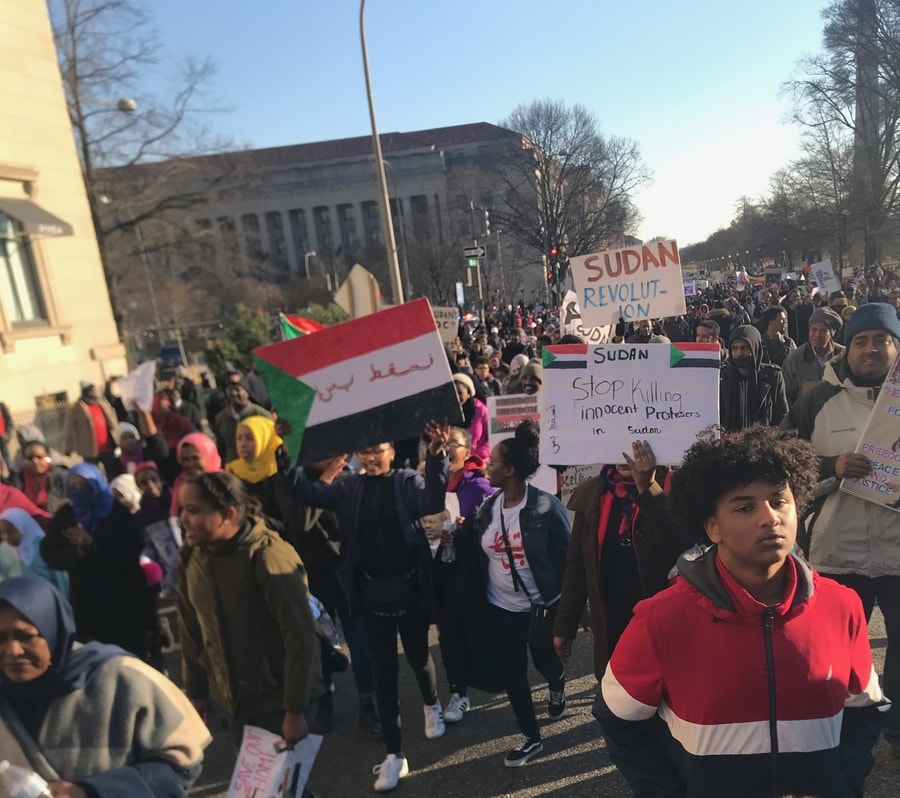
On 16 February 2019, Sudanese Americans and Sudanese US residents held the largest anti-government protest by the Sudanese diaspora in the US. At least, 1,000 participated in the march, which took place in Washington, DC, starting from the United States Capitol or Capitol Building and marched their way through the city towards the White House. People came from different parts of the country, as far as Arizona, Florida and Nebraska.
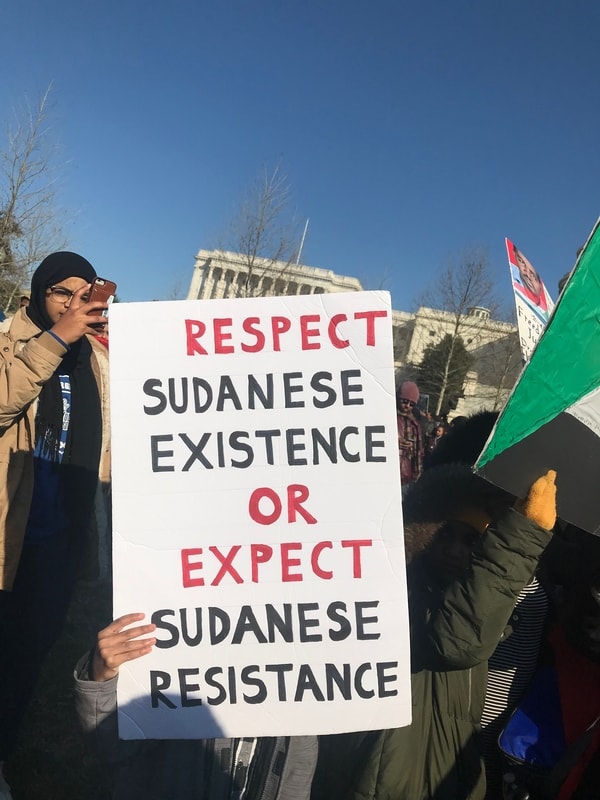
Holding Sudanese flags and signs with anti-government messages such as ‘Sudanese Dictator Kills’ and ‘Support the Sudanese Revolution for Freedom, Peace and Justice’, protesters chanted anti-regime slogans that called for the fall of the regime and even ethnic unity. Protesters of all ages were present from the elderly in wheelchairs to toddlers in strollers.
Speaking to some of the of the participants, many expressed their support and purpose for joining the protests. A first generation American from Gainesville, Virginia, 22-year-old Gihad said he came to protest in ‘solidarity with Sudanese people’. Despite the distance, he says ‘his roots connect him back to Sudan’.
When 27-year-old comedian Omar heard that the protest had ‘the potential of being the biggest [Sudanese American] in the US’, he travelled from New York to make sure he is there to witness it. He, along with many others, constantly shouted ‘تسقط بس‘ (Tasgut Bas), the slogan of the revolution aimed at Al Bashir and his regime, which loosely translates to ‘Just fall, that is all’. ‘It has become embedded in our culture’, said Omar. The slogan has become a daily anthem for anti-regime sentiments and the march to the White House was no exception.
#تسقط_بس #مدن_السودان_تتنفض pic.twitter.com/ccs1ukrBoJ
— طماطم الله كريم (@whykaykay) February 17, 2019
People that did not posses a natural affinity in politics previously felt compelled to voice their revolutionary chants against police brutality, economic hardships and corrupt governments. The protests aim to encourage those on the ground and show them their efforts are known beyond Sudan. ‘We respect, we aspire and we want to support them as much as we can here in the Diaspora,’ said Sudanese-American Heraa. Protesters like Heraa hope to garner attention from international media and governments. As a result of Al Bashir’s almost 30-year dictatorship, Sudan’s social fabric has also been tainted by corrupt policies, weak infrastructure and the proliferation of ethnic conflicts. If there’s anything the Sudan uprising has showed us, it’s the comradery of Sudanese people in times of need.
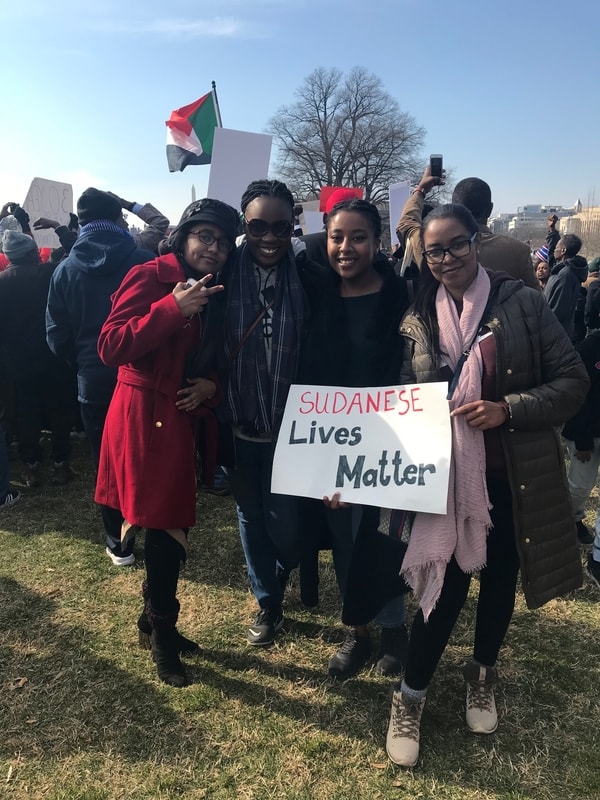
The protests were also attended by non-Sudanese, such as 37-year-old Kerry from Colorado, whose husband is Sudanese. With at least 1,000 people marching from the Capitol Building to the White House, Kerry believes ‘just as we have the right to protest here and have freedom of speech, the same should be in Sudan’. In her eyes, while the diaspora may be monitoring and participating from the peripheries, the Sudan uprising still has an impact on the livelihoods of families and friends in the diaspora. ‘We cannot distance ourselves from that’, said Kerry.
For many of those participating in the revolution in any way, the common theme is to express a message of solidarity for the people in Sudan and show them ‘they are heard, their lives matter, and we’re here to spread the message’ for international support.
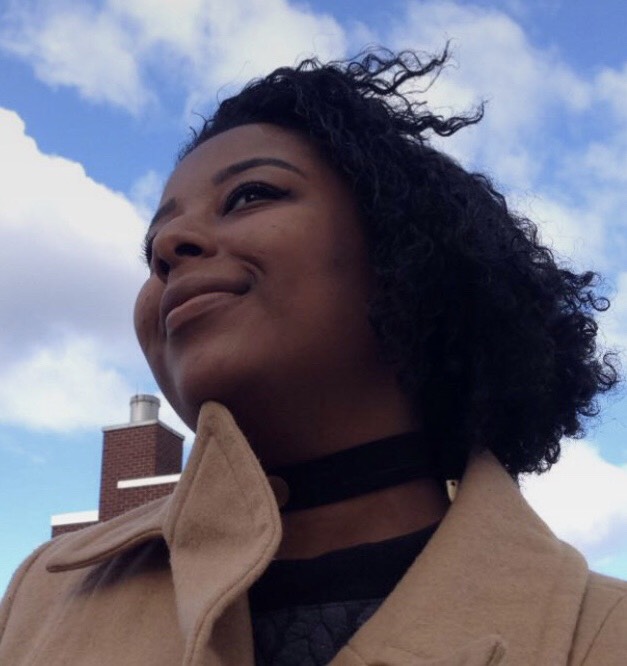 An aspiring peacemaker, Yousra Khalil graduated with an M.A. in International Affairs with a concentration in peace and conflict resolution from the George Washington University. When she’s not working on countering violent extremism, she enjoys trivia, naps, travelling, memes, and good food. Currently based in Washington, DC, Yousra splits her time between the US, Qatar and Sudan.
An aspiring peacemaker, Yousra Khalil graduated with an M.A. in International Affairs with a concentration in peace and conflict resolution from the George Washington University. When she’s not working on countering violent extremism, she enjoys trivia, naps, travelling, memes, and good food. Currently based in Washington, DC, Yousra splits her time between the US, Qatar and Sudan.


